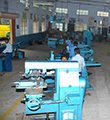
A Diploma in Electronics and Communication Engineering is a technical program that provides students with a comprehensive understanding of electronics and communication systems. This diploma typically spans three years and covers a range of subjects related to electronic devices, circuits, communication systems, and signal processing. Here are some common elements of a Diploma in Electronics and Communication Engineering course and potential career opportunities:




Many diploma programs include a project component where students apply their knowledge and skills to design and implement electronic systems.
Some programs may have an industrial training or internship component, allowing students to gain practical experience in the electronics and communication industry.
Depending on the program, students may have the option to choose elective subjects in areas such as embedded systems, VLSI design, or wireless communication.
Design and develop electronic systems and components.
Work on the design and optimization of communication systems, including wireless and wired networks.
Develop embedded systems for various applications such as consumer electronics, automotive systems, and industrial control.
Plan, install, and maintain communication networks, including voice and data transmission systems.
Design and manage computer networks for data communication.
Design and implement control systems for automation and robotics.
Work on the design and fabrication of Very Large-Scale Integration (VLSI) circuits and systems.
Specialize in radio frequency (RF) engineering, dealing with wireless communication systems and devices.
Ensure the quality and reliability of electronic products through testing and quality control processes.
Provide technical support for electronic products and systems.
Start your own business in areas such as electronics manufacturing, repair, or design consultancy.
Pursue higher education, such as a Bachelor's degree in Electronics and Communication Engineering or related fields, for expanded career opportunities.
 About Course
About Course
 Course Details
Course Details
 Laboratory Work
Laboratory Work
 Project Work
Project Work
 Industrial Training
Industrial Training
 Elective Subjects
Elective Subjects
 Career Opportunities
Career Opportunities








